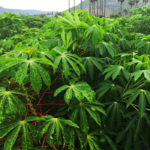Australian and Scottish researchers say modifying beta-glucan levels in barley may help contribute to lower cholesterol
A team of scientists has shown the potential to rapidly improve barley quality through the gene editing technique called CRISPR. Researchers at the University of Adelaide’s Waite Research Institute, working with colleagues at the James Hutton Institute in Scotland, recently showed how the levels of beta-glucan, a source of fermentable dietary fibre that may contribute […] Read moreTag Archives CRISPR

CRISPR gene editing can backfire
Biologists warn others to be careful when using the new technology because of what happened in a recent research project
A team of biologists is warning other researchers to be careful when using CRISPR gene editing, after finding the technology could backfire. According to a newly released scientific paper, the biologists used CRISPR on the cassava plant, hoping the technology would make it resistant to the mosaic virus. However, the method, which lets researchers precisely […] Read more



